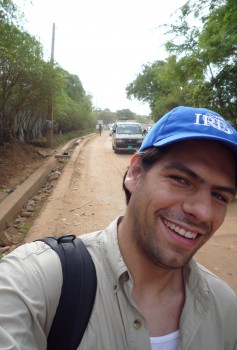Roads Taken and Not Taken: Jaime Loucky '04

Details
Although I didn't know it at the time, one of the most important decisions in my career in international development came approximately two weeks after graduating from Haverford, in the spring of 2004.
I had been staying with a girlfriend in New York, enjoying that short-lived feeling of freedom that comes from having both a college degree and a total lack of long-term plans. Everything changed over the span of a couple of days, when I received two phone calls. The first was from a friend with a job offer at a gourmet foods supplier in Spain. Based in Madrid, the two-year position would be responsible for quality and taste control at the office, which had an in-house chef who would prepare daily exotic dishes for us to taste.
The second call was from Haverford's Center for Peace and Global Citizenship. A small summer grant had been made available. It would allow me to spend three to four months working with a think-tank in the Balkans, studying anti-drug-and human-trafficking efforts along the Serbian/Bulgarian border. Other than the small stipend for living expenses the position would be completely unpaid.
I had started at Haverford four years earlier, drawn in large part to its Quaker tradition, and the importance it placed on personal and social responsibility. My father had studied at Haverford and gone on to become an anthropologist, and I shared his passion for international travel and a desire to do good in the world.
Clearly, I fit right in. With support from the amazing faculty and staff at the school, not to mention the other students, I was able to explore a wide range of issues in international relations and social justice. One of the most formative experiences came during my freshman year, when I took a course on Sports and Cuban-American Politics, taught by professors Anita Isaacs and Roberto Castillo-Sandoval. Along with 29 other students, including 20 members of the Haverford baseball team, we spent a week in Havana, meeting Cuban students, playing lots of baseball, and learning the power of sports to bridge political and geographical divides. My experience in Cuba led me to major in Political Science with a concentration in Peace and Conflict studies.
Back in New York, I had eventually reached a decision. As tempting as the position in Madrid was, it didn't have the social responsibility aspect that I was looking for. I took the unpaid summer internship.
Two weeks later I was on my way to Serbia with a backpack full of clothes and no return ticket. I spent the next eight months studying anti-trafficking efforts and stretching out my grant money by sharing an unheated apartment with three Serbian students.
When the grant funds finally ran out I moved to Barcelona, Spain, where I spent six months writing freelance for travel magazines, eventually coauthoring a book on the Winter Olympics with my uncle, David Wallechinsky. After finishing the Olympic book I moved to the U.S. and took a job in Washington D.C., working on an institutional contract with USAID's Office of Food for Peace. I spent the next two years working in the drab hallways of the Ronald Reagan Building, learning the world of food aid and donor-side development. With an annual operating budget of $1.2 billion, our office shipped staggering amounts of American-grown food to developing countries and disaster-impacted areas.
Two years after taking the job with Food for Peace I decided to make another shift, this time to a large international NGO where I began to focus on agricultural productivity and market development. Rather than shipping American-grown food, we were now trying to help vulnerable communities grow and sell their own crops in local markets.
My work with International Relief and Development, on the organization's Sustainable Food and Agricultural Systems team, now takes me regularly to the field, most often to South Sudan. I've gotten to know the challenges of field operations, living in a tent with no running water and little more than a generator and a 4x4 jeep. I've also seen our projects come to fruition, both figuratively and literally, as villages build community gardens and begin to harvest fresh fruits and vegetables to sell in local markets. I've also seen the limits of development projects in unstable countries, where a resurgence of violence can wipe out the slow advances of a community in mere moments.
After graduating Haverford in 2004 I decided to follow a path in international development, with no idea of where it would take me. Five years later I still don't know where I'll end up, but the journey so far has been exciting, challenging and rewarding.
Jaime Loucky '04 lives and works in Washington, D.C. and has co-authored three editions of The Complete Book of the Olympics.



